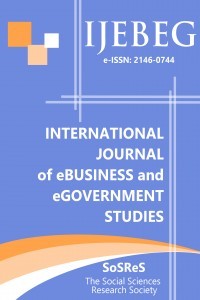A PRELIMINARY WORK ON INVESTIGATING UNITED NATIONS’S E-GOVERNMENT CRITERIA IN MIDDLE EAST COUNTRIES
A PRELIMINARY WORK ON INVESTIGATING UNITED NATIONS’S E-GOVERNMENT CRITERIA IN MIDDLE EAST COUNTRIES
The benefits of e-government initiatives empowered by the information and communication technologies, are acknowledged widely with assessment criteria published by the United Nations regularly over the last 15 years. One of the reasons that United Nations has taken such assessment into agenda is the apparent advantages of such initiatives over the citizen, society and government. In parallel literature review and current status of Middle East countries, these issues are investigated with examples: Internet users, awareness and training, culture, intention to use e-government applications of the citizens, portal and interoperability. It is noted that assessment of human capital indices for these countries should be read carefully while considering these topics. The findings reveal the impact of human capital index on evaluating egovernment performance; geographical area and population also affect the adoption of e-government. For this, follow-up work is suggested to investigate the level of information and communication technology and computer literacy along with these factors in the region. This research has limitations which include the sources of information, exclusive economic and legal issues and a number of measurement methods.
- Başlangıç: 2009
- Yayıncı: Sosyal Bilimler Araştırmaları Derneği
Sayıdaki Diğer Makaleler
Edmore Tarambiwa, Chengedzai Mafini
AN ASSESSMENT OF CHURN DETERMINANTS IN ZIMBABWE’S MOBILE TELECOMMUNICATION SERVICES
Lynn Hwambo, Roy M. Shamhuyenhanzva, Maxwell Sandada
A PRELIMINARY WORK ON INVESTIGATING UNITED NATIONS’S E-GOVERNMENT CRITERIA IN MIDDLE EAST COUNTRIES
Mohammed HUSSEIN, O. Tolga PUSATLI
C. Synodinos, DG Price, AL Bevan Dye
INTENTION TO USE M-GOVERNMENT SERVICES: AGE, GENDER AND EDUCATION REALLY MATTER?
Annie Ng Cheng San, Choy Johnn Yee, Krishna Moorthy, Alex Foo Tun Lee
MEASURING AND MODELLING INTERNET BANKING SERVICE QUALITY IN SOUTH AFRICA
Ephrem Habtemichael Redda, Jhalukpreya Surujlal
INFORMATION TECHNOLOGY IN ACCOUNTANCY CURRICULA: NECESSITY OR AFTERTHOUGHT
